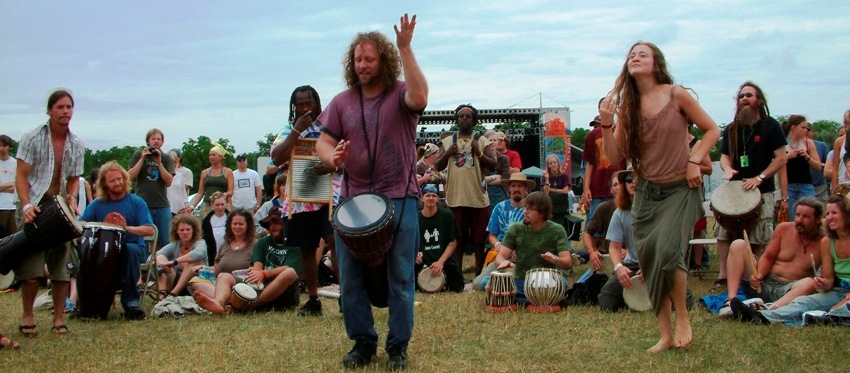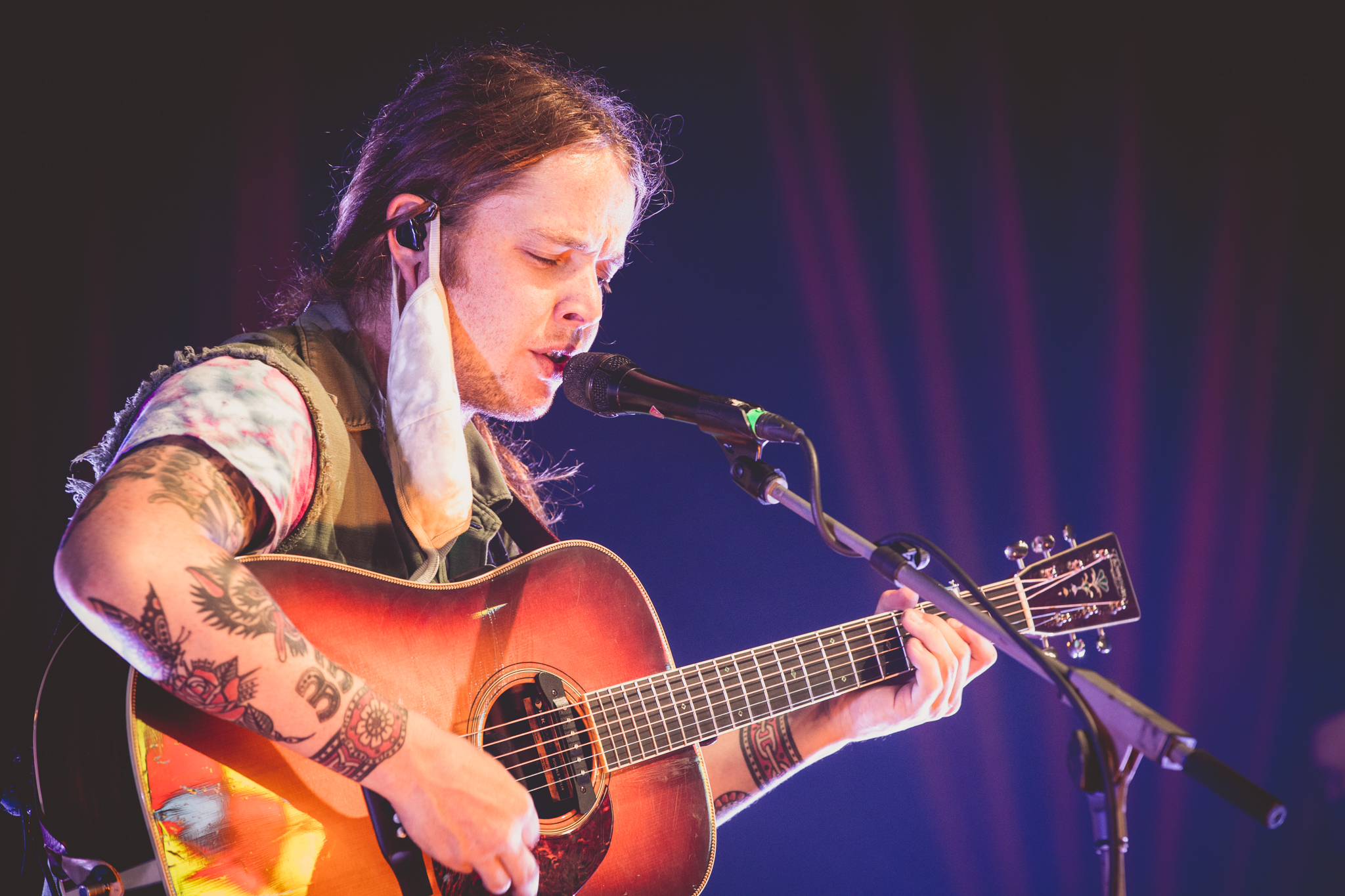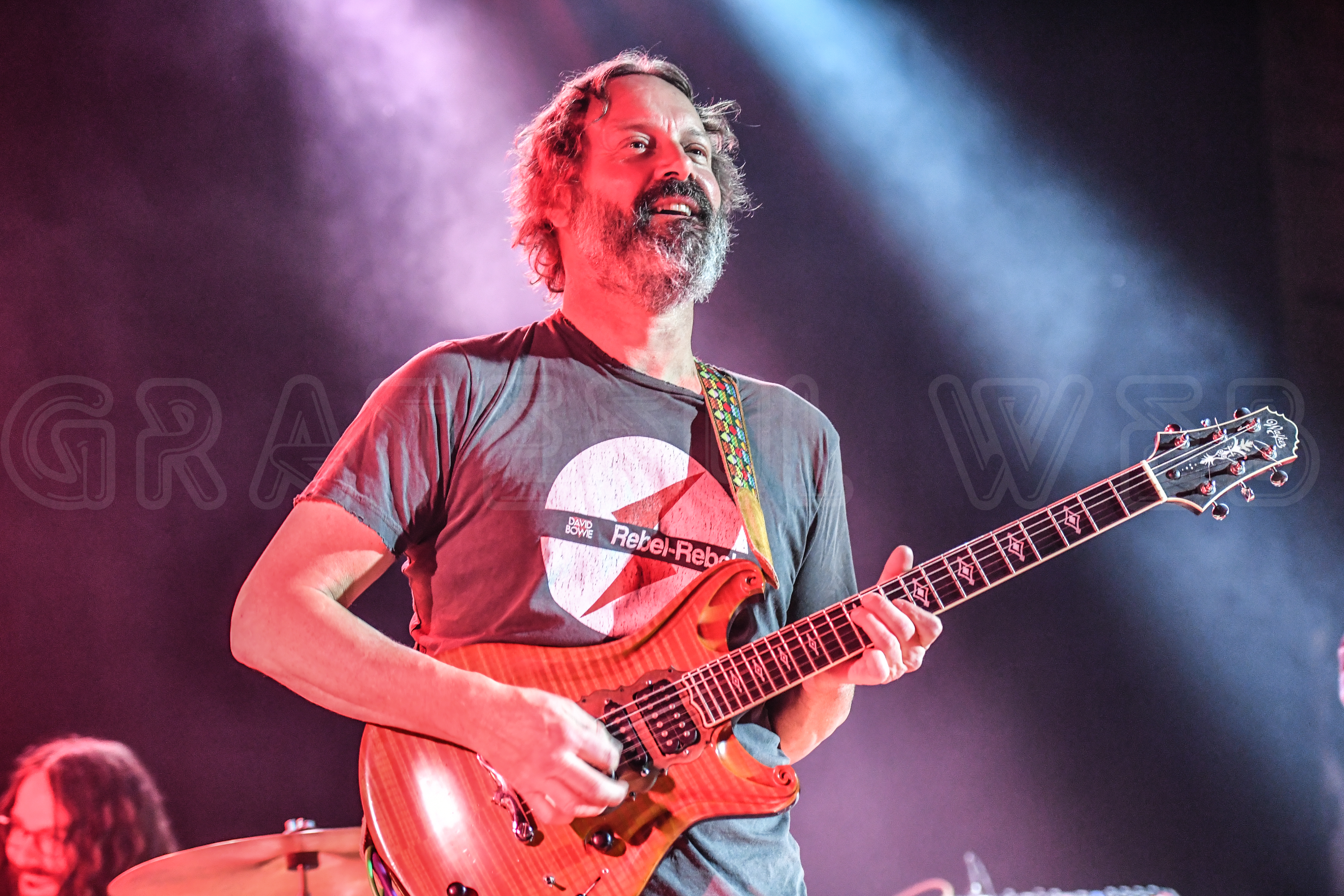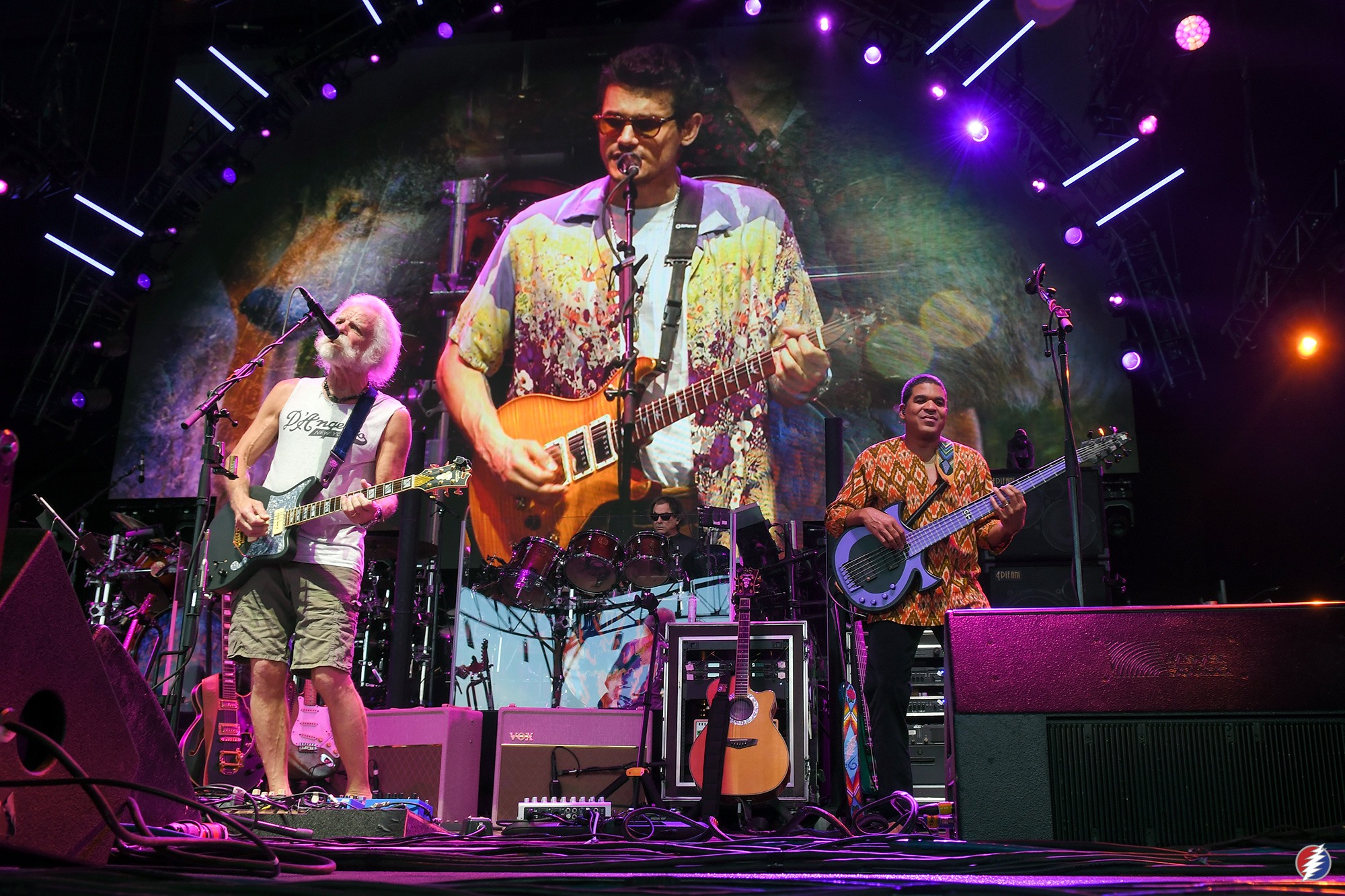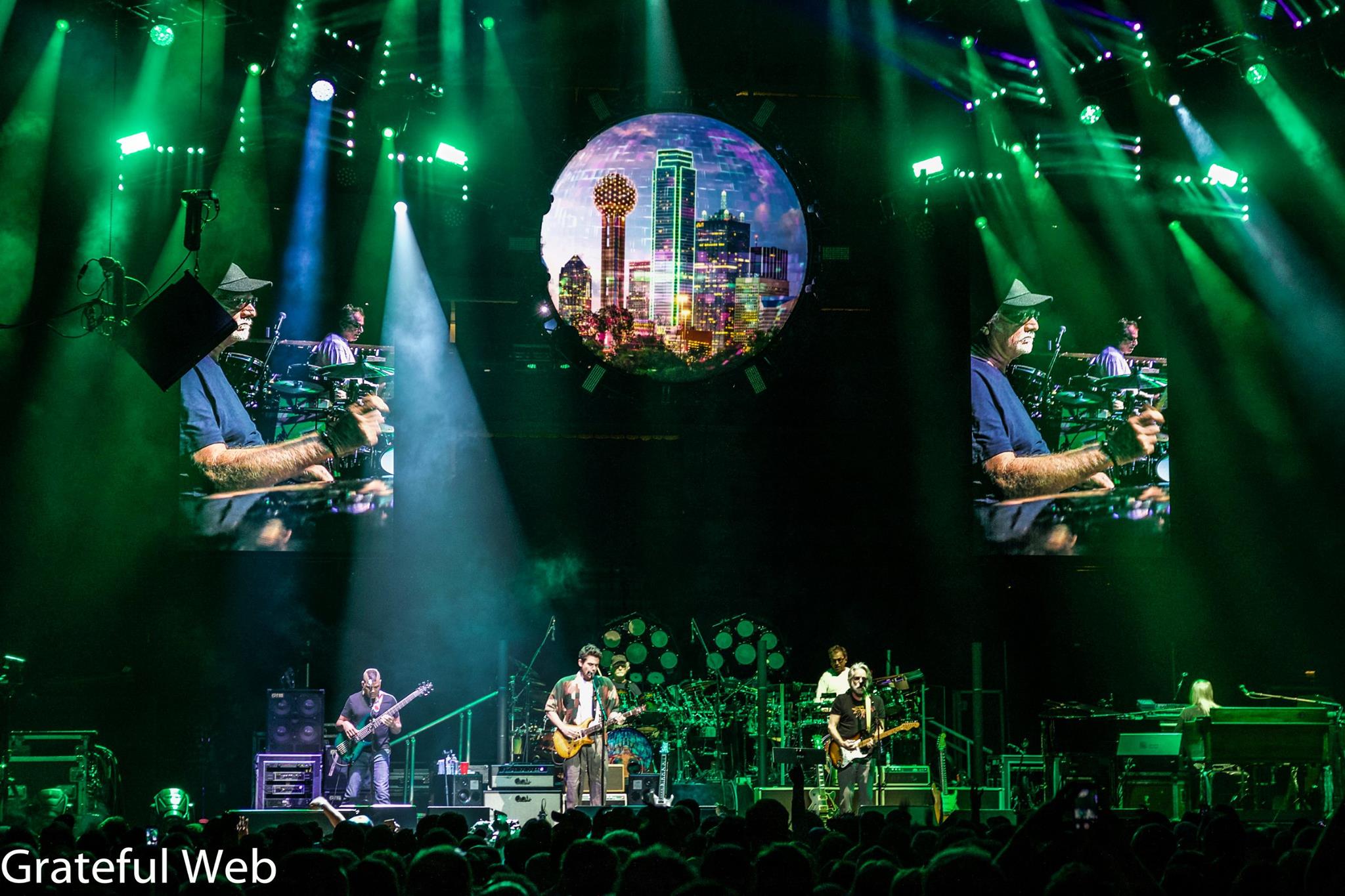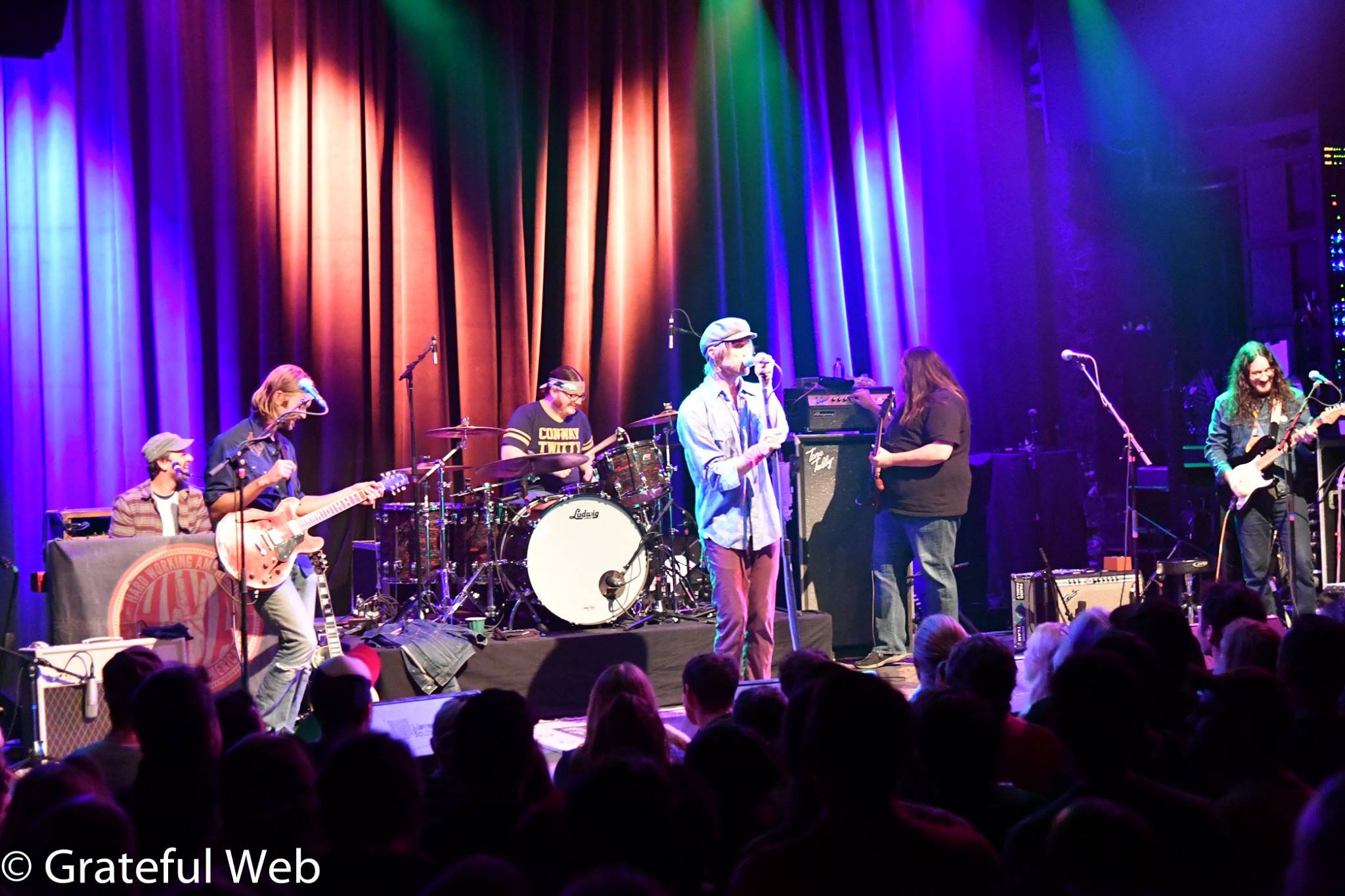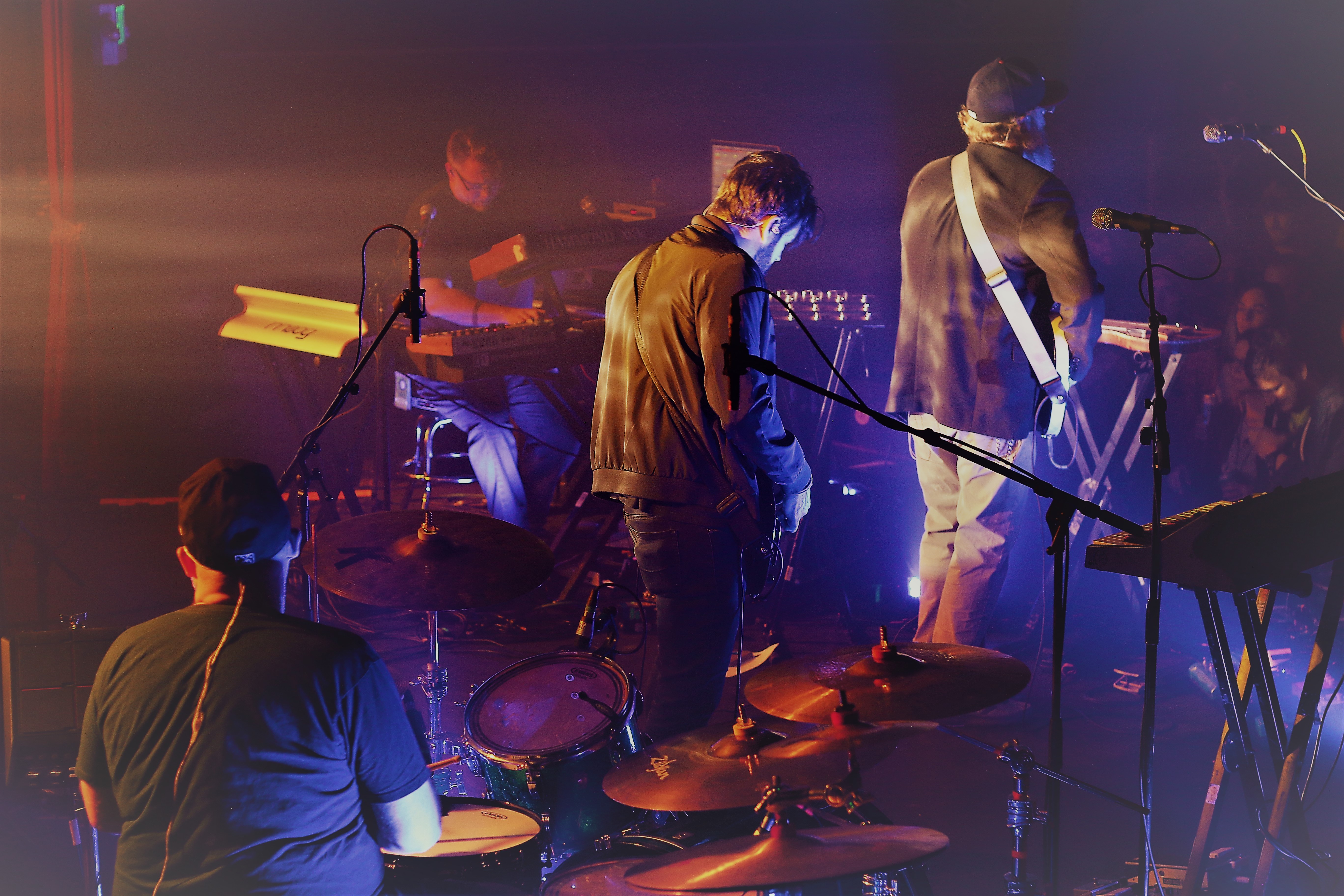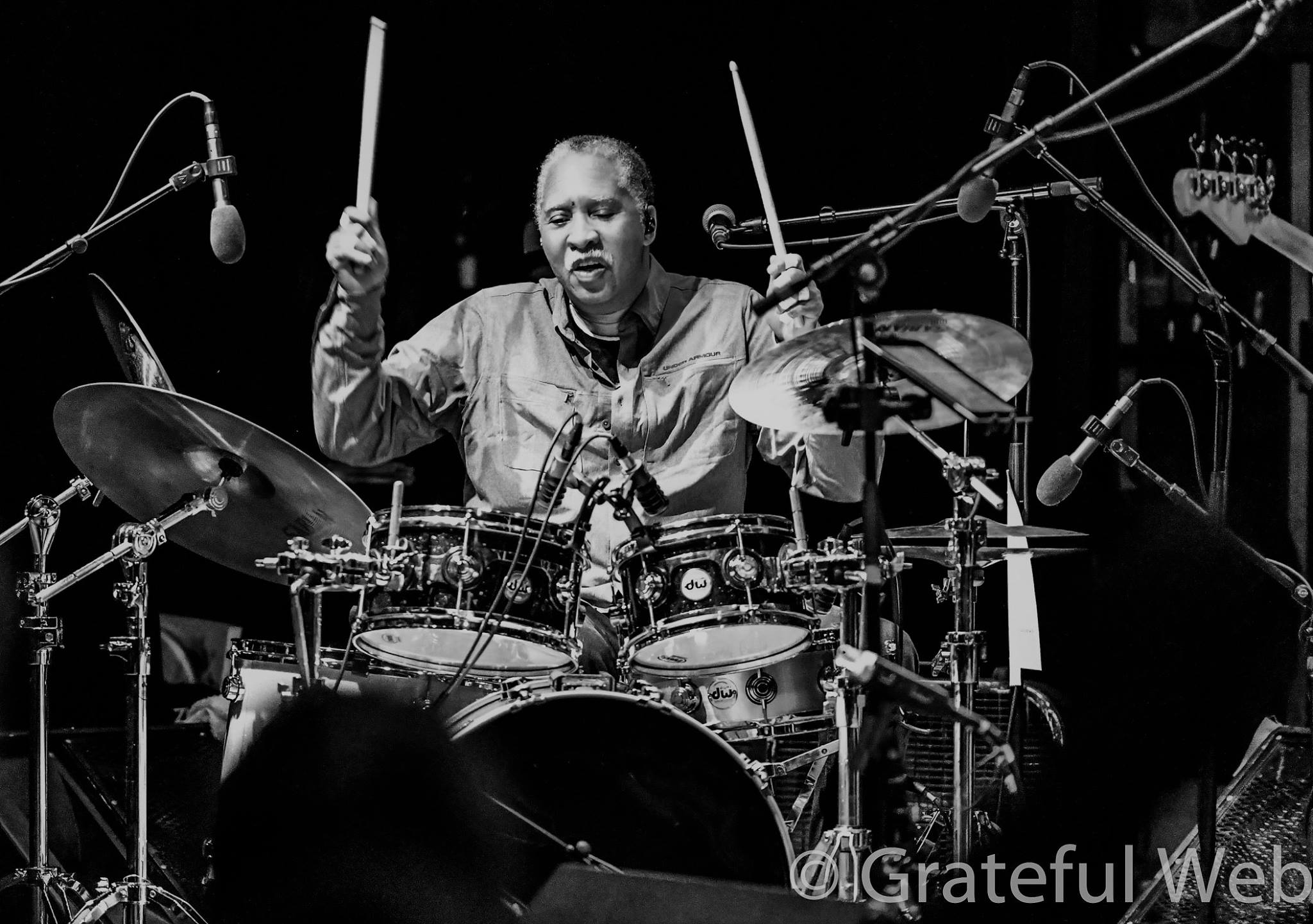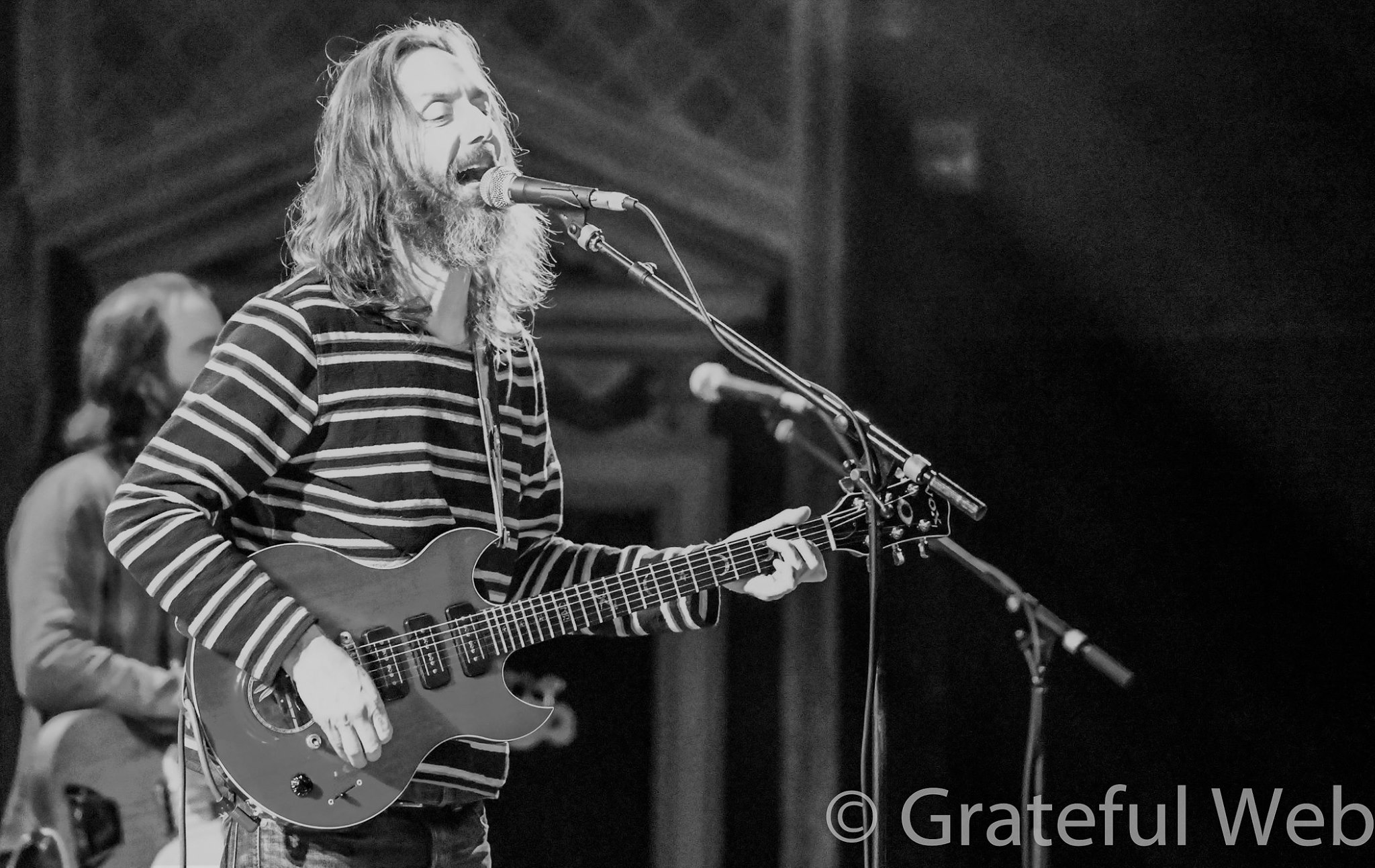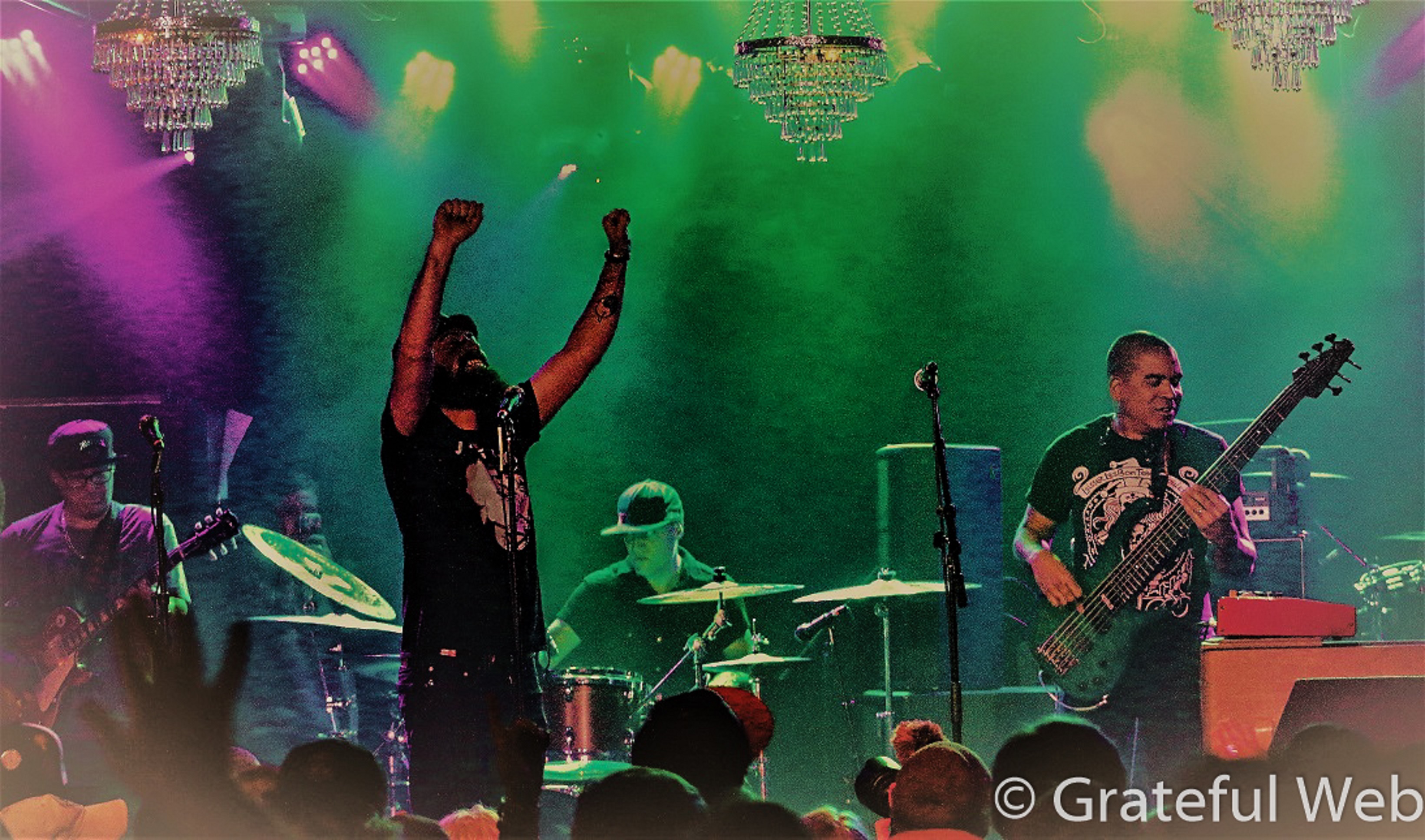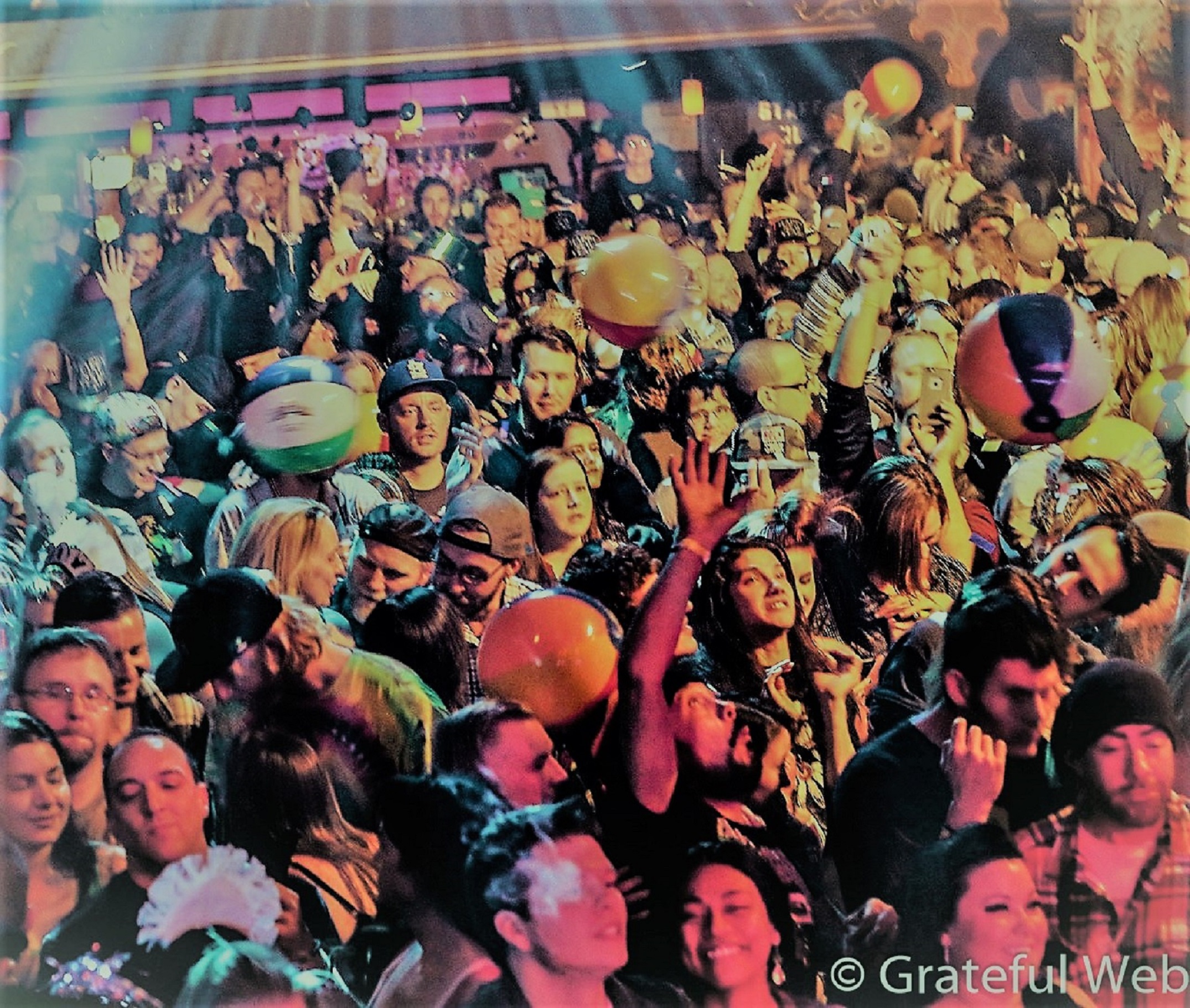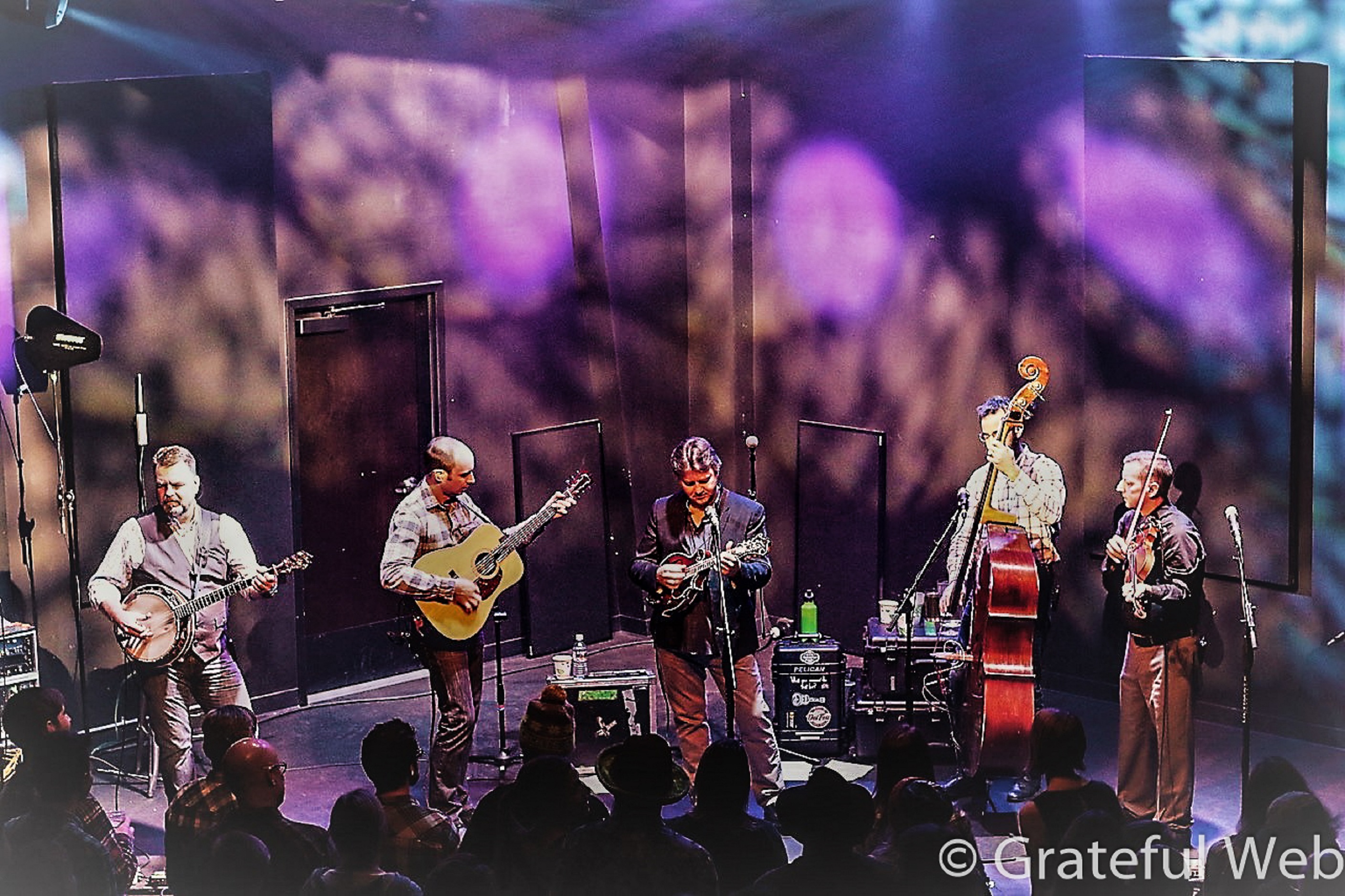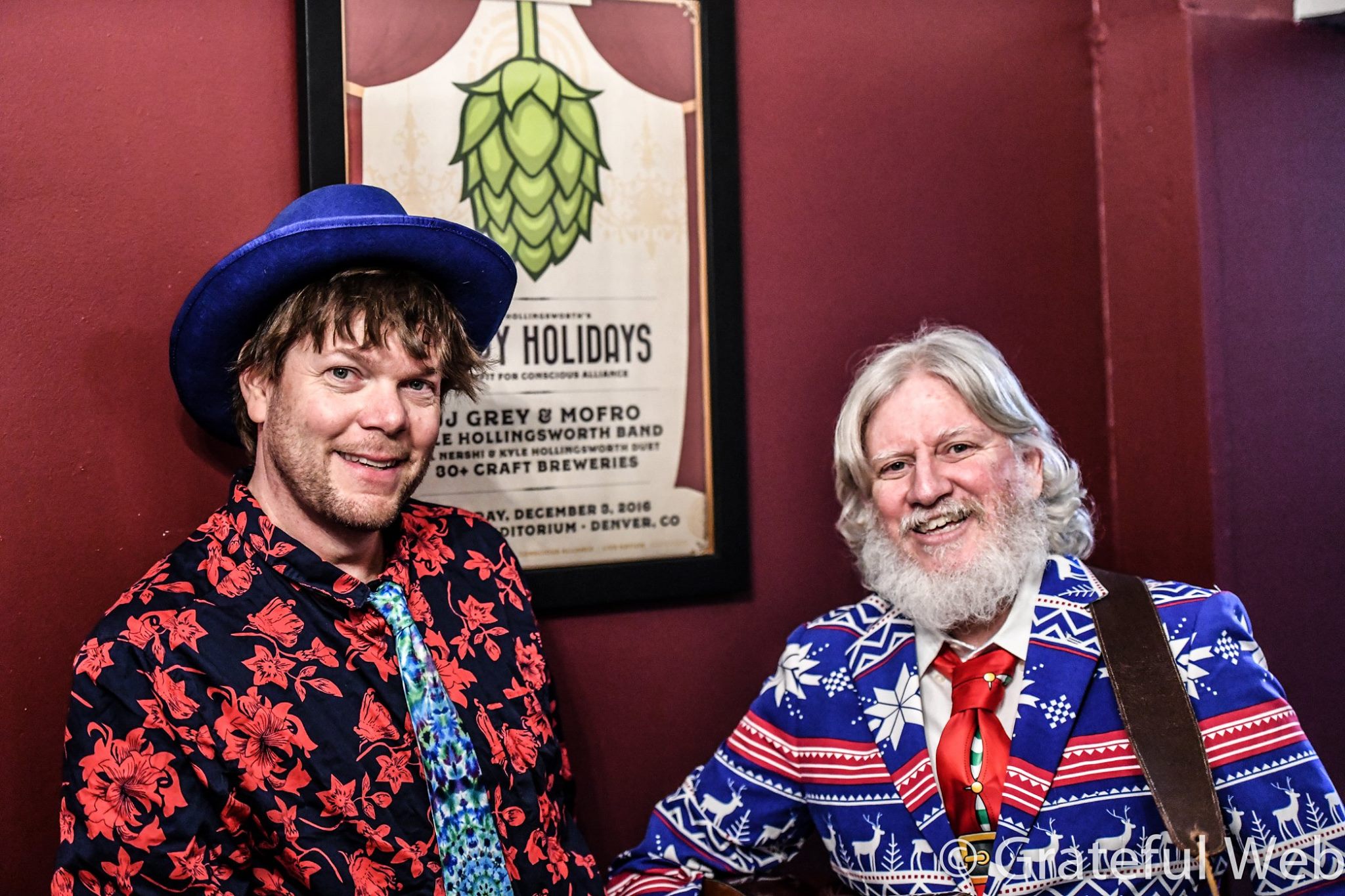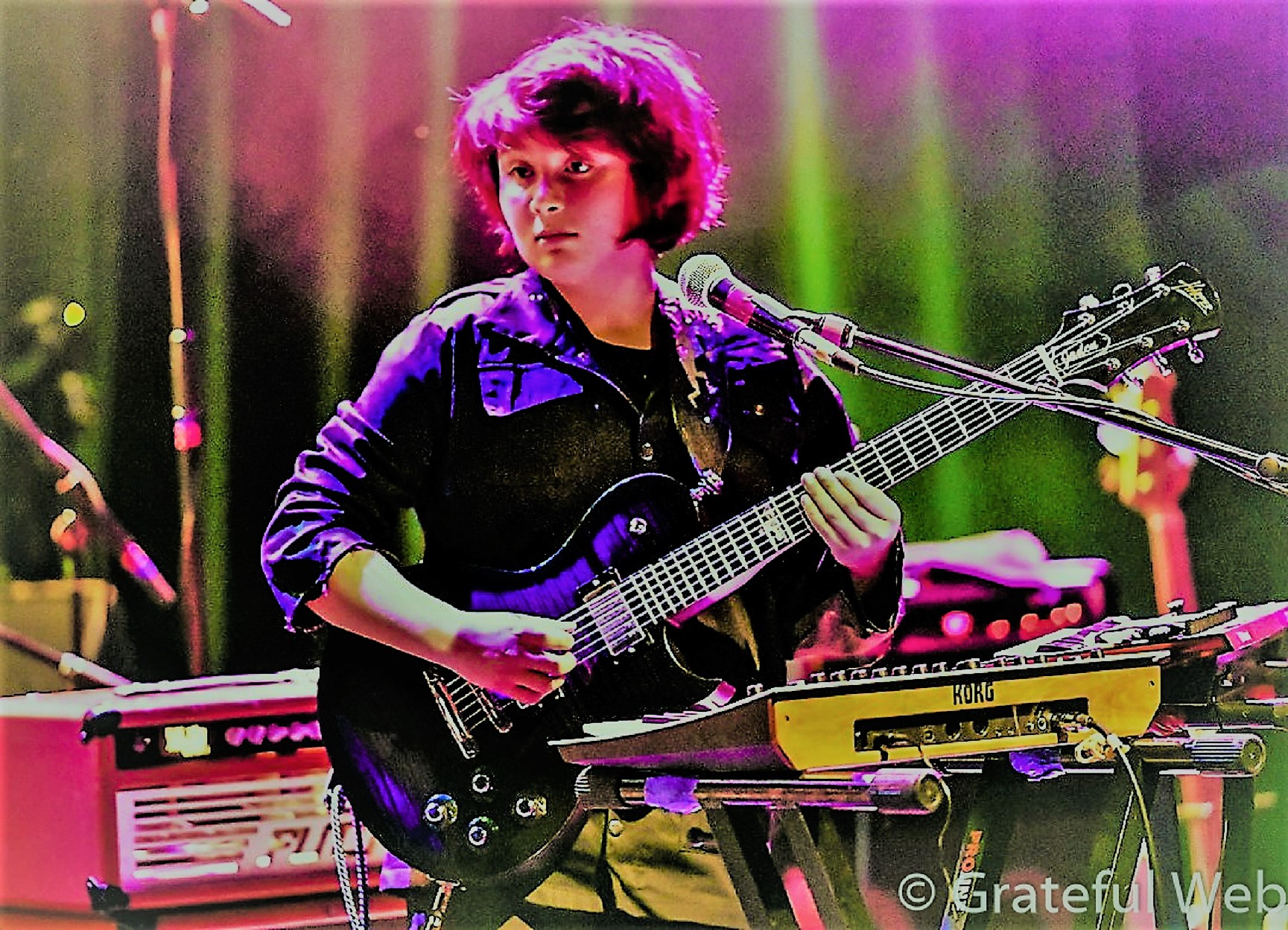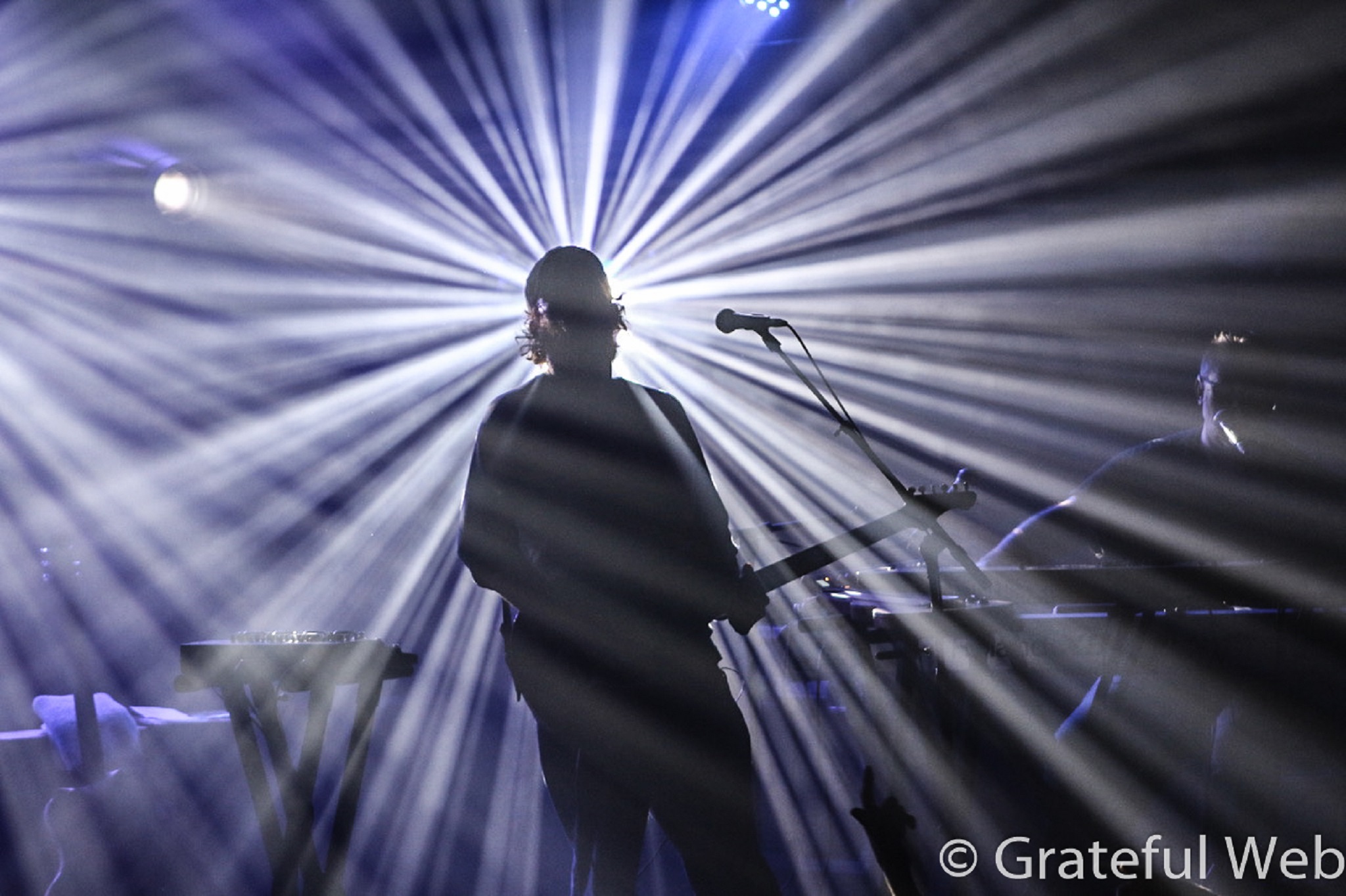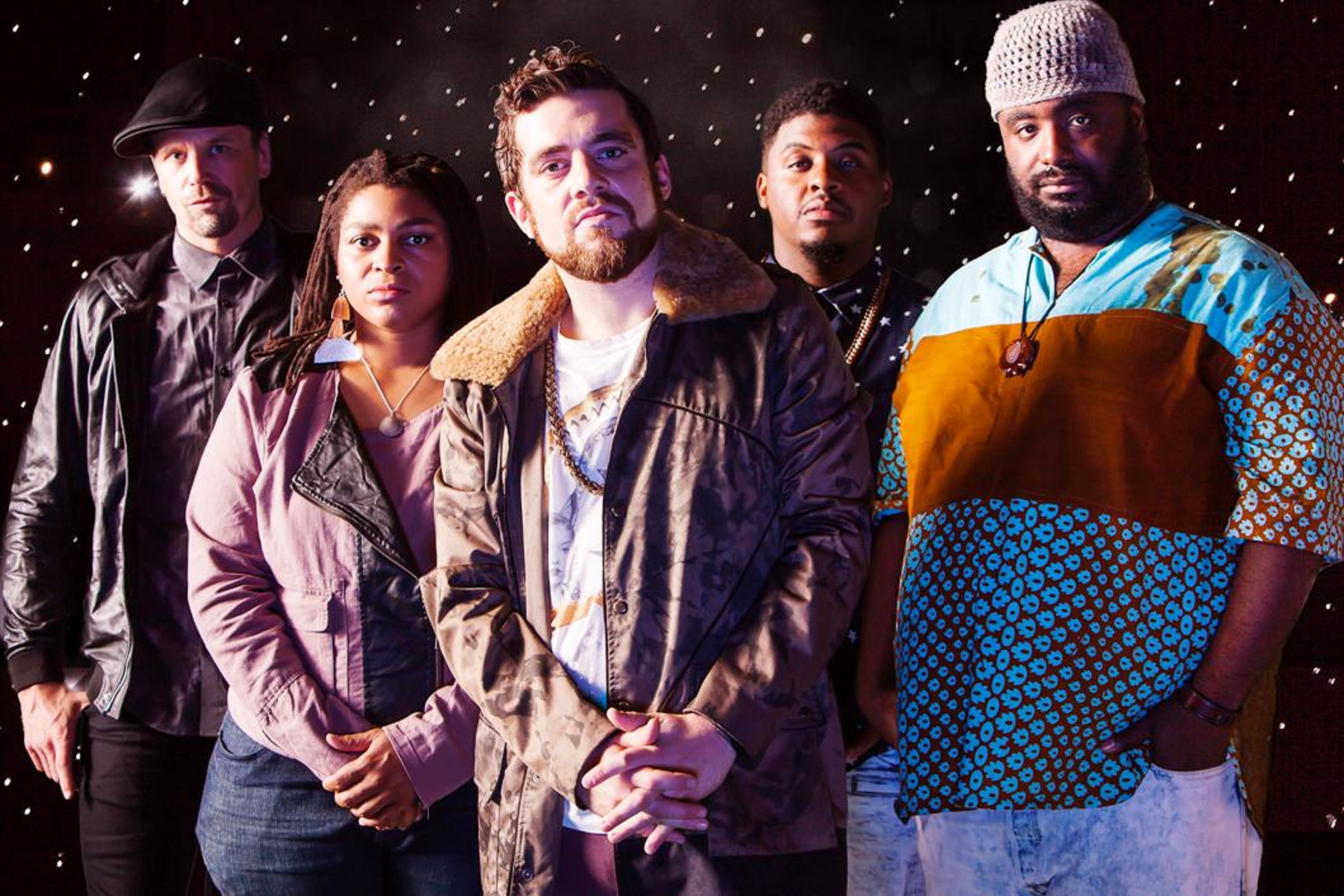Drummer/percussionist Jason Hann of EOTO and the String Cheese Incident recently took time out his on the run touring schedule to speak with the Grateful Web’s John Schumm. Currently in the midst of EOTO’s multi-month spanning Outer Orbit Tour, the all-live improvisational electronic duo continues to enhance the audio and visual front they’ve helped revolutionize. Armed with an impressive array of instruments and gadgetry, some they’ve chosen and some they’ve stumbled into acquiring by way of losing or breaking gear, Jason Hann and Michael Travis are as well known for EOTO’s in the moment musical excursions as their tandem drumming in String Cheese Incident. The Outer Orbit Tour has dates ranging from coast to coast and everywhere in between before culminating in a finale at The Ogden Theatre in Denver, Colorado on December 13th.
GW: My name is John Schumm and I’m here today with Jason Hann of EOTO and the String Cheese Incident. EOTO, you and Travis, are kicking off the Outer Orbit Tour here in a few days and that bounces around through November. How are you doing, what’s going on, and what’s new these days?
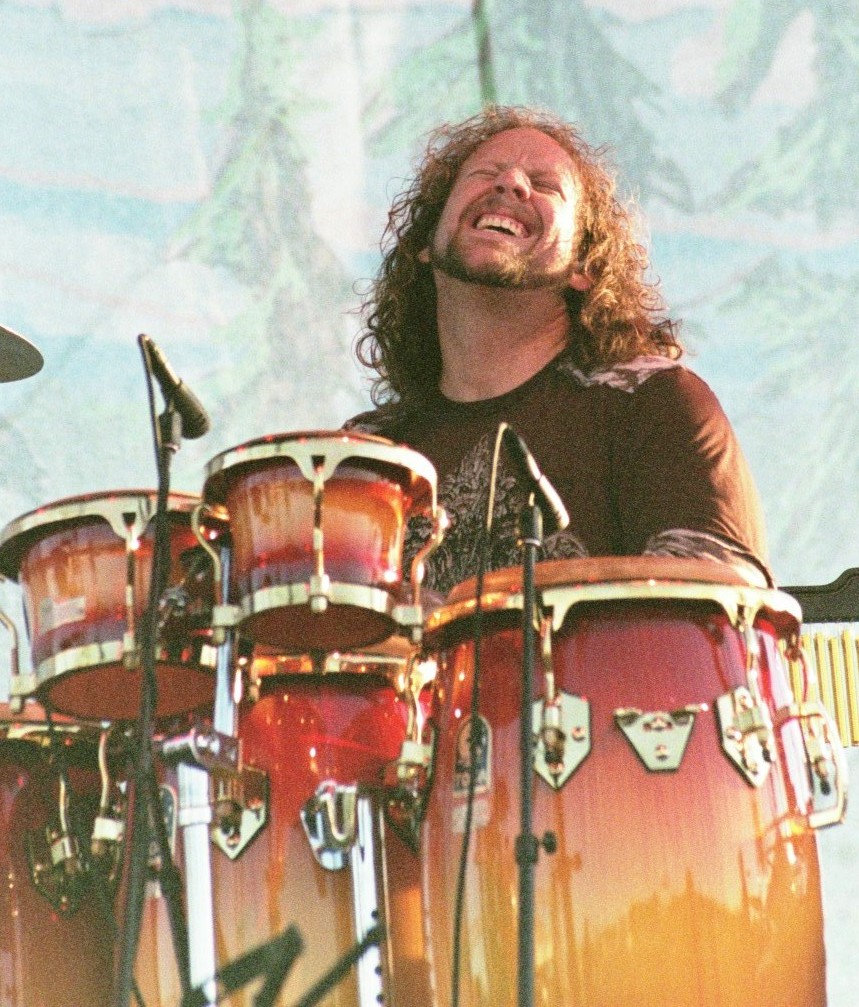 JH: Everything is going well. Getting super excited for the tour to start this week. Its kind of one of those things where it’s not like we haven’t been playing. We did Infrasound up near Minneapolis this past weekend, and before that was basically three weeks of String Cheese world for those festivals and before that it was a mixture of EOTO and String Cheese. So really since about May it’s been non-stop. I think we had one weekend off. So even though a tour is starting, playing venues, its been go all the way and hasn’t been a lot of downtime, which is good, that’s great, because all of the weeks keep leading into the next and there’s always something to build on and it kind of pushes that next level to take it to.
JH: Everything is going well. Getting super excited for the tour to start this week. Its kind of one of those things where it’s not like we haven’t been playing. We did Infrasound up near Minneapolis this past weekend, and before that was basically three weeks of String Cheese world for those festivals and before that it was a mixture of EOTO and String Cheese. So really since about May it’s been non-stop. I think we had one weekend off. So even though a tour is starting, playing venues, its been go all the way and hasn’t been a lot of downtime, which is good, that’s great, because all of the weeks keep leading into the next and there’s always something to build on and it kind of pushes that next level to take it to.
GW: I’m sure. Between the two bands it sounds like you’ve definitely been busy. I was at the Lock’n Festival, I caught the Sting Cheese set there so I know you guys have been rehearsing all of the songs for there (Kool and the Gang tribute), and the moon songs from Phases of the Moon Fest.
JH: Cool, I’m glad you got to check that out and Phases definitely was a continuation of a good run of shows and that’s probably the best example. Lock’n was great but Phases felt like we took another step, you know, just feeling good about how it came out.
GW: So Michael and yourself originally came together in String Cheese Incident, and while both bands, EOTO and String Cheese, are very different, both share a knack for being exploratory in their sound. In String Cheese you’ve got your percussion setup and with EOTO you’ve got your kit, laptop, Ipad, vocal headset and all kinds of gadgetry. Do you welcome that change of pace with each band, doing different things with each, and what’s the biggest benefit to performing with Michael in two totally different bands?
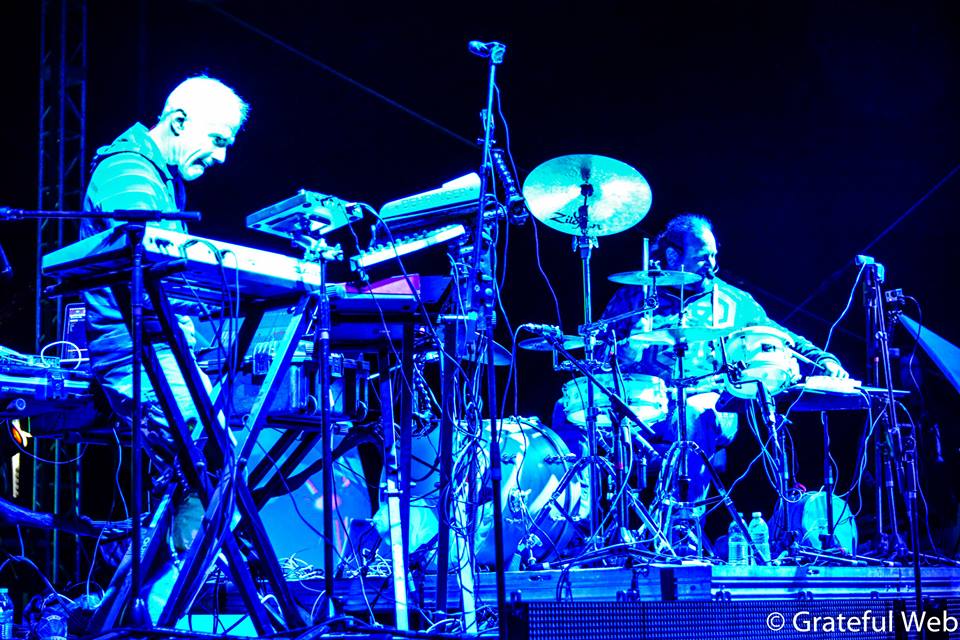 JH: Well on the first part of it, about switching or changing up roles, it feels like almost a necessity for myself, personally, because I really enjoy doing lots of different things. When I wasn’t with either band, I was bouncing between a bunch of groups between studio sessions all the time and doing something way different on a day to day basis. And so when you settle into being in a group, it’s kind of like you dive into the music that you’re playing and you get at it in a pretty deep level because you’re always working on that, and say with String Cheese, that configuration with all six of us and how we’d go about doing practice and approaching songs and playing live with each other, because we feed off each other. So to switch it up and be like, whoa, this is a whole other thing, and other parts of the brain get to be used now. It has a cumulative effect, and also playing all different styles of music has a different aesthetic to it as far as how you approach it musically. When I play drums with EOTO I’m thinking almost more of the way someone would program a drum machine in terms of the type of pattern I would play, but definitely giving it that human feel. So the reference is different. When I’m playing percussion with String Cheese I’m thinking of all the bubbly and organic things that other percussion players that I really like or what the particular song needs, and it tends to be on the…I have all of these references. When I’m playing with EOTO my influences are more like these are the producers that I really like and how might they be approached with what I’m doing right now. So it’s great having all of the variety of things to do between the two bands.
JH: Well on the first part of it, about switching or changing up roles, it feels like almost a necessity for myself, personally, because I really enjoy doing lots of different things. When I wasn’t with either band, I was bouncing between a bunch of groups between studio sessions all the time and doing something way different on a day to day basis. And so when you settle into being in a group, it’s kind of like you dive into the music that you’re playing and you get at it in a pretty deep level because you’re always working on that, and say with String Cheese, that configuration with all six of us and how we’d go about doing practice and approaching songs and playing live with each other, because we feed off each other. So to switch it up and be like, whoa, this is a whole other thing, and other parts of the brain get to be used now. It has a cumulative effect, and also playing all different styles of music has a different aesthetic to it as far as how you approach it musically. When I play drums with EOTO I’m thinking almost more of the way someone would program a drum machine in terms of the type of pattern I would play, but definitely giving it that human feel. So the reference is different. When I’m playing percussion with String Cheese I’m thinking of all the bubbly and organic things that other percussion players that I really like or what the particular song needs, and it tends to be on the…I have all of these references. When I’m playing with EOTO my influences are more like these are the producers that I really like and how might they be approached with what I’m doing right now. So it’s great having all of the variety of things to do between the two bands.
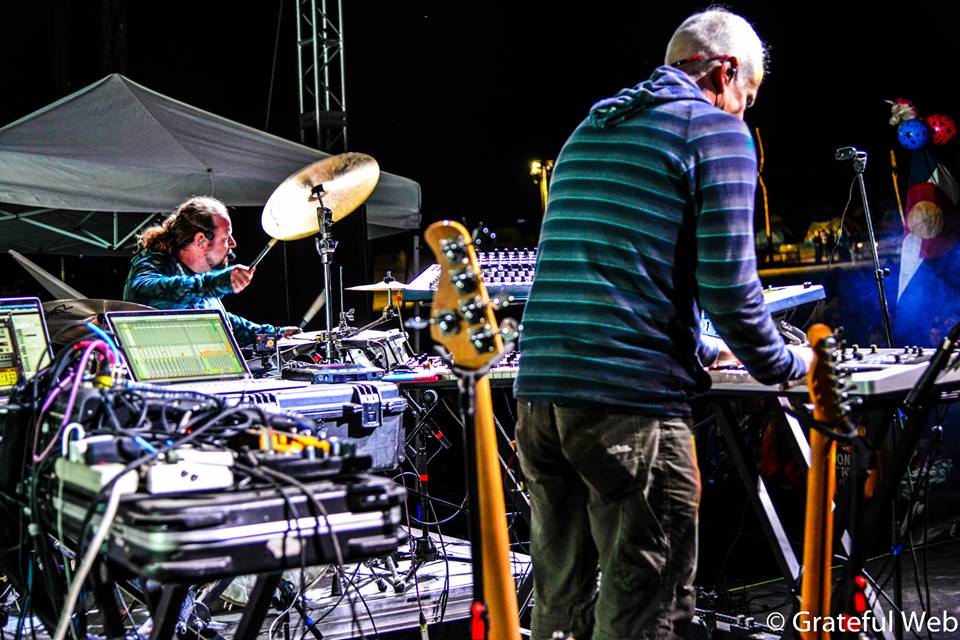 And doing both of those with Michael has been amazing. While we’re doing the looping side of things and improvised music type of thing with EOTO, it’s funny. The type of music that we do in EOTO seems like it needs to be more towards a drumming mentality as far as you’re thinking of distinct patterns to play and thinking of phrasing and thinking of the type of structure, song structure. Almost like the way a drummer normally thinks, because we’re playing this music and the concentration isn’t so much on the solos as it is building these parts on top of each other and then we he does build parts to free himself to take a solo, that’s the bonus, and it doesn’t have to be wizardry at that point. It just has to be the right, tasteful thing for what we’re doing. So I think that helps us, being two drummers, and we have to work like a quick track in our head so there’s some preciseness to it that lends itself to coming off the right way.
And doing both of those with Michael has been amazing. While we’re doing the looping side of things and improvised music type of thing with EOTO, it’s funny. The type of music that we do in EOTO seems like it needs to be more towards a drumming mentality as far as you’re thinking of distinct patterns to play and thinking of phrasing and thinking of the type of structure, song structure. Almost like the way a drummer normally thinks, because we’re playing this music and the concentration isn’t so much on the solos as it is building these parts on top of each other and then we he does build parts to free himself to take a solo, that’s the bonus, and it doesn’t have to be wizardry at that point. It just has to be the right, tasteful thing for what we’re doing. So I think that helps us, being two drummers, and we have to work like a quick track in our head so there’s some preciseness to it that lends itself to coming off the right way.
GW: Did you guys know each other before you joined String Cheese some ten years ago?
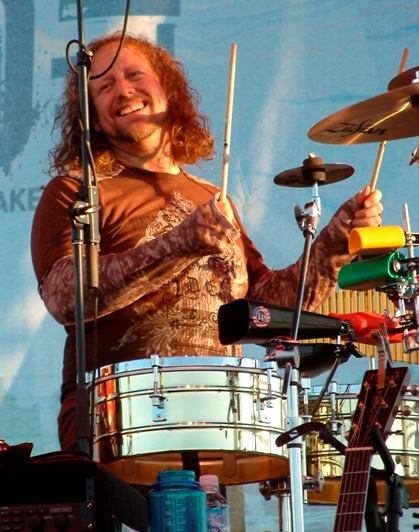 JH: We had met back in 96’, 1996, at one of the High Sierra Music Festivals and he just kind of came over to see a band I was playing with, and he introduced himself to me and invited me to play hand drums over at the String Cheese bus, Bussy. And there was another percussionist there, Jarrod Kaplan, I think he’s from Seattle, and we played for the rest of the afternoon. It was such a good hang and we exchanged information, I think someone recorded a drum session and put it on an album or something, or one of their friends’ records, us sort of drumming in the background. And then we kept in touch maybe two phone calls a year after that. In 99’ I sat in with String Cheese once in LA and once in San Diego, but there were also ten other people sitting in at the same time so I didn’t really get to know anybody in the band. When 2004 came around, Travis gave me a call out of the blue saying that there’s a chance they might be looking for another person to join String Cheese, they don’t know, but why don’t you come down and sit in when we come through Los Angeles. And that was kind of the evolution of how that came about.
JH: We had met back in 96’, 1996, at one of the High Sierra Music Festivals and he just kind of came over to see a band I was playing with, and he introduced himself to me and invited me to play hand drums over at the String Cheese bus, Bussy. And there was another percussionist there, Jarrod Kaplan, I think he’s from Seattle, and we played for the rest of the afternoon. It was such a good hang and we exchanged information, I think someone recorded a drum session and put it on an album or something, or one of their friends’ records, us sort of drumming in the background. And then we kept in touch maybe two phone calls a year after that. In 99’ I sat in with String Cheese once in LA and once in San Diego, but there were also ten other people sitting in at the same time so I didn’t really get to know anybody in the band. When 2004 came around, Travis gave me a call out of the blue saying that there’s a chance they might be looking for another person to join String Cheese, they don’t know, but why don’t you come down and sit in when we come through Los Angeles. And that was kind of the evolution of how that came about.
GW: Are you from LA originally?
JH: I’m originally from Miami; I grew up in North Miami Beach and ended up going into the Navy just after high school. That’s what got me to the west coast and California. At that time, all of my favorite bands were on the west coast and thinking that none of these bands ever come down here, they only stop in Georgia or northern Florida, which is a seven-hour drive from Miami. So I never really got to see the bands that I really liked. So the Navy was like, you can go to Chicago, to be based there, or based in San Diego. I was going to be going in December, so there was no question. So I ended up doing that right after high school.
GW: Beautiful part of the country. Can you give us some examples of bands you were into at the time?
JH: Well at that time, being my super rebellious self and wanting to have my own music…I had been a drummer already. I had played with my dad’s band in Miami, at that time he was doing a mix of things. He would play a lot of Caribbean music during the day and early hours, with international musicians sitting in. So that was my exposure to early international music. I’d been playing reggae about as long as I was playing rock and roll. And he would have band members join him for his rock stuff, which was more Police stuff, Crosby Stills and Nash, and Rolling Stones and that kind of thing. So I liked playing that kind of music, that’s what I learned to play, but the friends I went to school with, we were all into a mix of King Crimson and Yes, but also the Minute Men and the Meat Puppets and all the SST Label guys. Like Sonic Youth before they got popular, but mostly the Cali bands like Minutemen and Fishbone, Black Flag. Those are the bands I wanted to go see. And when I got to San Diego State University, all of those bands would come through. This band House of Freaks, which was this amazing duo of guitars and drums that would put the White Stripes to shame, really, put most bands to shame. I would have so much fun after getting in off some Navy trip and I’d see what’s going on in the paper. I think the campus club was called The Backdoor, and there was just always good stuff going on there.
GW: Fishbone, I love those guys. I got to catch a few of their shows this summer on the west coast.
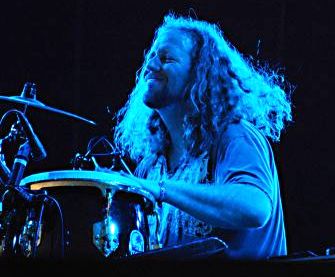 JH: Their original drummer, I think his last name is Fish and maybe brothers with Norwood or something; anyway, I’ve done some studio sessions with him out in Venice Beach. He actually became Justin Timberlake’s drummer for his first tour. It was kind of a trip in the studio, guys saying he was JT’s drummer, and we got to talk and I’m like, wait a minute, you play in Fishbone! Holy crap. And then I fan boyed him for a little bit.
JH: Their original drummer, I think his last name is Fish and maybe brothers with Norwood or something; anyway, I’ve done some studio sessions with him out in Venice Beach. He actually became Justin Timberlake’s drummer for his first tour. It was kind of a trip in the studio, guys saying he was JT’s drummer, and we got to talk and I’m like, wait a minute, you play in Fishbone! Holy crap. And then I fan boyed him for a little bit.
GW: Would you say that some of those bands have influence in your music and during EOTO shows?
JH: There are definitely times. Like whenever we go to DC. Another group I liked was Bad Brains. There’s a crew of kids that I know there and have had these talks about. And if we ever go there I’ll drop some Bad Brains lyrics. And I’ll put them over not because we’re playing a punk song, but because we’re doing something else. And then I’ll throw, I don’t know, sometimes certain lyrics will just come to me depending on what we’re playing, you know, and it doesn’t necessarily fit the style of what it was originally in, but just drop it and there’ll be like four people who talk to me later and say, ‘oh my god you did that Bad Brains thing,’ and I’m like, yeah. (Laughter)
GW: I really like those parts of the show where you start saying things like that. The last time I caught you guys at the Fillmore in Denver there were some aspects of that too.
JH: Yep
GW: How did you get that going? It doesn’t seem like you’re singing but you say some things and it gets looped around in the sounds, how did that come about?
JH: Well at this point I don’t really loop it anymore. I used to loop my voice a little bit more but then I got this harmonizer that I use live that can harmonize my voice. So I don’t have to stack a chorus together like I used to. I can just hit a button and all of the sudden there are two other people singing in harmony with me. And I can do more things on the fly like that. At least what I’m doing. Travis, I mean his whole gig is looping and stacking things, so my side of things is not really looping anything, and more like, ok, I’m turning this button and I’m still playing drums and affecting my voice, which is something I started to have more fun doing instead of keeping track of what loops are on which channels.
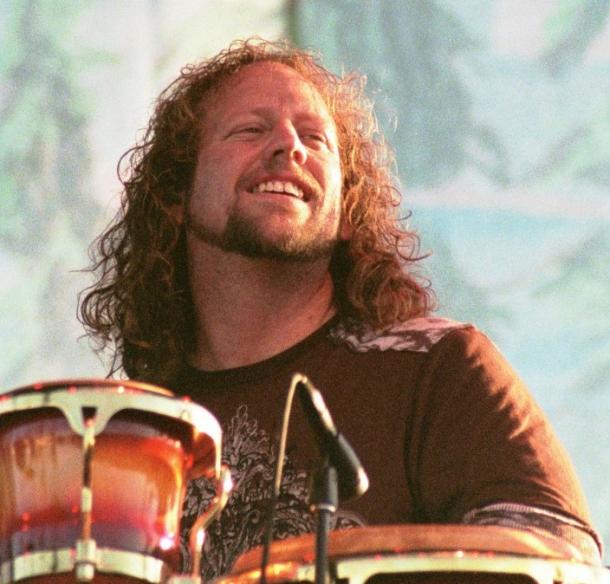 How did I come about the singing? Well that’s actually kind of funny, because just about everything in EOTO has been accidental, how things came about. We did a gig; I think it was in Breckenridge, at the 320 South Club. Our crew guy actually forgot my electronic pad, I used to have this electronic drum pad that I used for EOTO and I’d play parts on there and I would loop those parts and stack up electric drum parts that I’d be playing along with. And that was a lot of fun, but he forgot it one time at the start of tour, and I was like man, that’s my whole gig that’s gone. And this was the start of tour and I said how I really needed it for the rest of tour, and we decided we’d work it out, whether he’d get it or try to get someone drive it out to us. But he ended up having to go get it, which meant that he wasn’t going to be back for the show. So I thought about what I could do different, and I said I’d just sing drum parts with my mouth. I still had it set up to loop some parts, like handclaps, and that’s sort of where it started. I went, oh, that was fun, and we talked and decided I should do more of that, so I started putting little eeks and ahs and making other weird alien noises with my voice in addition to that and then one time, I don’t remember what the first things was that I sung, but got some great feedback from people that were checking it out and I started going a little more into it like that.
How did I come about the singing? Well that’s actually kind of funny, because just about everything in EOTO has been accidental, how things came about. We did a gig; I think it was in Breckenridge, at the 320 South Club. Our crew guy actually forgot my electronic pad, I used to have this electronic drum pad that I used for EOTO and I’d play parts on there and I would loop those parts and stack up electric drum parts that I’d be playing along with. And that was a lot of fun, but he forgot it one time at the start of tour, and I was like man, that’s my whole gig that’s gone. And this was the start of tour and I said how I really needed it for the rest of tour, and we decided we’d work it out, whether he’d get it or try to get someone drive it out to us. But he ended up having to go get it, which meant that he wasn’t going to be back for the show. So I thought about what I could do different, and I said I’d just sing drum parts with my mouth. I still had it set up to loop some parts, like handclaps, and that’s sort of where it started. I went, oh, that was fun, and we talked and decided I should do more of that, so I started putting little eeks and ahs and making other weird alien noises with my voice in addition to that and then one time, I don’t remember what the first things was that I sung, but got some great feedback from people that were checking it out and I started going a little more into it like that.
It’s interesting; because when I was first learning drums I was rapping at the same time. I would sit in with my dad and play drums and do a rap at the same time, while we were doing a funk song or a Rick James song or something like that. And you know, there was just that whole chunk of stuff I used to do as a kid and had just stopped doing, and this was sort of a thing that opened the door for me to let those other things sneak back in. And so particularly with the rapping thing, I was just treating it as another drum, because it was such a cool layer to be able to jump into a Busta Rhymes line. It was so rhythmic and challenging to work on, but I get off on it as much as…when you play tabla, drums from India, you learn how to play the drum but the way you learn how to play the drum is by saying the syllables of the drum (imitating drumming with syllables). All of these things you can do on a drum you have to be able to do with your voice, so then it’s like wow, I can practice both at the same time. So there were so many things like that that became more appealing, and getting the crowd feedback was a lot more encouraging to dive deeper into it.
GW: It seems like a natural progression then.
JH: Yeah, definitely. But there are a lot of things we’ve done in EOTO where it has come out of an accident or some piece of gear breaking. Like, dammit, that was a key piece of gear, and Travis would get through it and we’d be like, well, we found this new thing to do because it forced us to do that. So that’s been a nice part of dealing with electronic gear and having it break down on you and adapting in the moment.
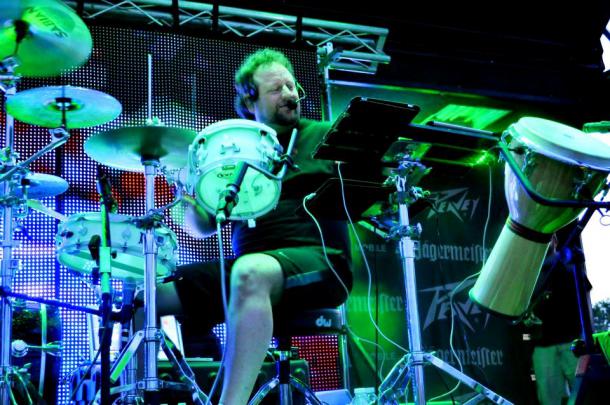 GW: It’s nice hearing some of the background on this. I know there are videos on YouTube and on the website about you guys detailing all of the gear you have on stage, and videos of you guys at Apple Stores to give demonstrations on how an IPADs and MacBooks can play a part in your sound. Are there any new toys, any new gear you plan on using this tour?
GW: It’s nice hearing some of the background on this. I know there are videos on YouTube and on the website about you guys detailing all of the gear you have on stage, and videos of you guys at Apple Stores to give demonstrations on how an IPADs and MacBooks can play a part in your sound. Are there any new toys, any new gear you plan on using this tour?
JH: For me in particular, not so much. There’s still so much for me to do within the set of what I already have and tricks to do with the software. On my side of things it’s mostly just hankering down with the stuff that I already have to do and trying to be a little more of making melodies with my voice and making some other things in that regard, so that I feel like I’m getting better on the fly and making up melodies and after I’ve done that, just kind of knowing what that is creating another piece of it, whether that’s giving a middle eastern flare to my voice or putting a wash of reverb on it, similar to the band Aparat, I don’t know if you’ve heard them. They’re a great more downtempo group, but the guy actually loops his voice live but then gives it this wash that’s just really hypnotizing. So there are definitely some things in there to try and see what works.
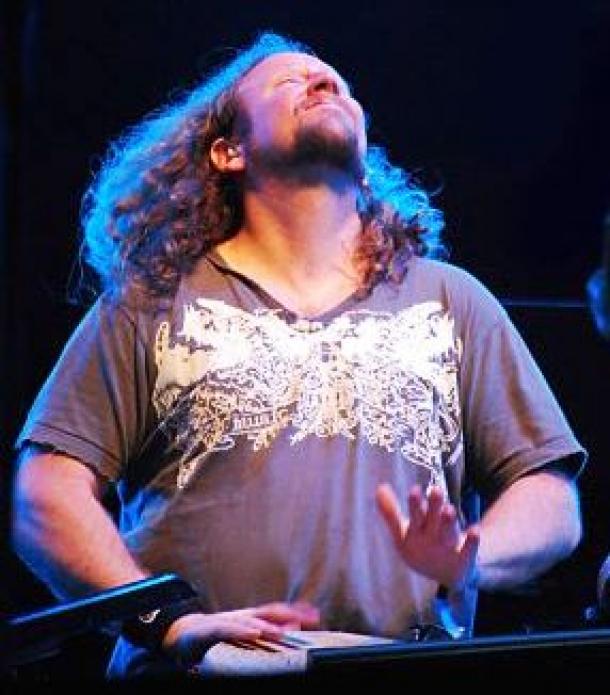 And on Travis’ side of things, I know his setup has changed quite a bit. He seems to interchange keyboards in and out and now he’s got two double keyboard setups in his rig. I don’t know exactly what’s going on there (laughter) but sometimes I look over and say, hey, that’s a different keyboard than last time, and you know, it’s good because it can’t help but to mix up sonically what we’re doing too.
And on Travis’ side of things, I know his setup has changed quite a bit. He seems to interchange keyboards in and out and now he’s got two double keyboard setups in his rig. I don’t know exactly what’s going on there (laughter) but sometimes I look over and say, hey, that’s a different keyboard than last time, and you know, it’s good because it can’t help but to mix up sonically what we’re doing too.
GW: Touching on how you guys are creating a new show, every night with the improvisational aspect and how that separates you from the pack. I was going to ask you if you ever get tired of creating something new every night, or if emotions throughout any given day can factor into what you’re doing each night? But it also sounds like exploring the gear itself and what you have in front of you can help in that regard as well.
JH: Oh yeah, I would say both of us are of the ADD natural mindset, where keeping things interesting is the search for both of us, and I think something that happens playing live, improvised music is you can’t help but, I mean, you can never really…not relax but there’s always the next thing we have to move to. Treating the set in the ay that a DJ treats a set is every three minutes or so you have to move on to, for a DJ a new song, or for us it would be a new texture or song, well we don’t have songs, but every three minutes we treat those areas like songs, and within those songs there’s going to be a break, a verse section and breakdown section, and you know all of these things have to happen so we’re crating these sections within a three minute period and by the time that’s up, and there’s a solo in there or somewhere, and then we move onto the next. So there’s not really time to think about, not necessarily how the days going today, and what kind of mood you’re in, except the fact that we totally feel off the energy of the people too. So, if we hit some certain thing where we’re going through the motions but it feels like it’s particularly resonating with the people, then we’ll hang out there for awhile until we feel like we’ve gotten everybody on board and can take them on our own journey to wherever we’re going. So we don’t seem to ever run out of things to do. There are some things we’ll get into habit wise, like if we’re going to set up and go into this particular feel that something else happens that we do in a similar way, but usually after you do that for two or three weeks then you just get tired of doing it yourself and kind of recognize it. I say the one downfall is that it doesn’t contribute to retaining memory of anything, because you get used to doing that and moving on, do that move on, do that move on, do that move on. And then I’m like, where are my keys at, and I don’t know, that happened a long time ago! So there’s some basic memories that you get used to being in that mind moving on to the next thing, and I find myself if I’m not in the habit of doing things like, I know exactly where I put my keys at the beginning of the set, or my wallet or my phone, and those seem to be the hardest parts, actually. (Laughter) And now you think I’m weird.
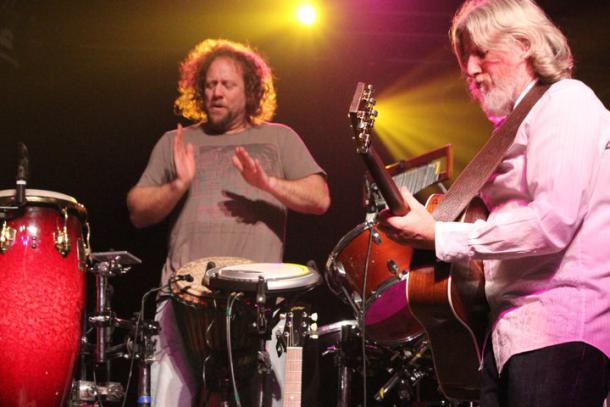 GW: Ha, not at all. The tour is called The Outer Orbit Tour. I read that there’s going to be some upgrades, which is hard to believe, to the lights and overall production. You guys have been known over the years to have the lotus flower, visual mapping, and all sorts of cool stuff going on to a point where it becomes a part of the show. Some people see lights as an accompaniment to the show and music, but with you guys there is so much going on that the visuals become a main part of the show and experience. Is there anything you can tell us about what you have coming up?
GW: Ha, not at all. The tour is called The Outer Orbit Tour. I read that there’s going to be some upgrades, which is hard to believe, to the lights and overall production. You guys have been known over the years to have the lotus flower, visual mapping, and all sorts of cool stuff going on to a point where it becomes a part of the show. Some people see lights as an accompaniment to the show and music, but with you guys there is so much going on that the visuals become a main part of the show and experience. Is there anything you can tell us about what you have coming up?
JH: Well, it looks like, for the entire tour, we’ll have projection mapping, our guy Devin, does that and is part of our lotus setup. We’re going to be having our laser guy, Hunter, on tour with us, and he’s been doing stuff on and off with us for the last few years, and he’s always great and super creative with the way he goes about doing lasers, which is one of the reasons we particularly wanted him to do it. Just because he totally gets what we’re doing and doing his thing on the fly, the way we’re doing it, and he’s open creatively to different things. For example, we were in Springfield, Il doing a show, and he’s setting up his lasers and checking sight lines, and we had some of our object that Devin maps onto, and said do you think you can trace that object Devin has over there with a laser? And he’s like, yeah, I can do that. And we started playing around with it, and that Tie Fighter that we usually have blowing up on the little dome, we started coming up with this method of mapping out lasers on the fly, which, they aren’t done. We looked online to see who else was mapping out lasers for their shows, and it’s just this thing that hasn’t happened yet, but all of the sudden it added this new dimension that people would remark about, saying, I haven’t seen that type of visual information at a show. So the fact that he’s psyched to do whatever and has these amazing, and in nerdy ways, these 60,000 point lasers on the road with us, can allow him to do a lot of things that you normally just can’t do, and we’re psyched to bring it all out on the road, which makes it fun to dig in creatively. And artistically all the way around, the same way we do it musically, so if people are looking around or opening their eyes or taking a break from dancing, that there’ll be something aesthetically pleasing or aesthetically invigorating going on for them at our show.
GW: Well I definitely feel like there always has been. The last couple of shows I’ve seen I was blown away with everything that was going on. It’s pretty cool to see and hear what you have coming up. I’ll be at the Denver show, as of now the last show of the tour. You probably spend a lot of time in Colorado, with the String Cheese gang and everything. Do you feel more of a response in Denver and around Colorado than in other parts of the country, or other parts of the tour you’ll be on?
.jpg) JH: Denver, in general, seems to be ground zero for anyone that comes through and has their biggest audiences except for maybe their hometown, or even bigger than their hometown. That’s been the same for us. String Cheese practices in Colorado, and four of the six of us live in Colorado. So we spend a bunch of time practicing there, hanging with management and playing there. I would definitely argue that between Denver and Boulder, well, all of the Colorado scene in general, might be the best scene in the country, and easily, too. I live here in Los Angeles, but in LA you have so many different scenes that aren’t connected, and kind of popping off in their own world. But you don’t have this general sense of knowing everybody when you get to a show and whenever I go out in Colorado, I see a lot of either similar people or run into people that might take a five minute conversation to realize you know somebody from their crew or something. It’s very connected. So yes, to play for a Denver crowd, and get them off, it’s particularly pleasing. They give that energy right back to you, and there are so many people that moved to Colorado just for the music scene alone, so they’re already amped, and they already see so much that you have to do something outstanding to grab them, but when you do, wow, there are multiple rewards back to you for the effort.
JH: Denver, in general, seems to be ground zero for anyone that comes through and has their biggest audiences except for maybe their hometown, or even bigger than their hometown. That’s been the same for us. String Cheese practices in Colorado, and four of the six of us live in Colorado. So we spend a bunch of time practicing there, hanging with management and playing there. I would definitely argue that between Denver and Boulder, well, all of the Colorado scene in general, might be the best scene in the country, and easily, too. I live here in Los Angeles, but in LA you have so many different scenes that aren’t connected, and kind of popping off in their own world. But you don’t have this general sense of knowing everybody when you get to a show and whenever I go out in Colorado, I see a lot of either similar people or run into people that might take a five minute conversation to realize you know somebody from their crew or something. It’s very connected. So yes, to play for a Denver crowd, and get them off, it’s particularly pleasing. They give that energy right back to you, and there are so many people that moved to Colorado just for the music scene alone, so they’re already amped, and they already see so much that you have to do something outstanding to grab them, but when you do, wow, there are multiple rewards back to you for the effort.
GW: Hell yeah, makes me glad to live out here. I was one of those people that moved out here for a combination of music and snowboarding, so I’m right there with the rest of them.
Anyway, so wrapping up, I know you guys had a studio album back in 2009, but obviously the live shows are the meat an potatoes that you do. I was noticing how you release most of the live shows for sale afterwards, allowing people to take the experience home with them and relive it anyway they want. Do you guys plan on doing another album in the near future, or does it even make sense for you to go into the studio to record?
JH: In EOTO world right?
GW: Yes.
JH: Let’s just say the studio experience for us is almost the exact same as a live show except in EOTO world we’re not purposely doing anything, we’re just free flowing, but in the studio we’ll free flow, but on the same thing for like twelve minutes, and we’ll take the best six minutes of that and then go back to the individual tracks and make sure certain sounds aren’t sticking out, and try to make it a little more pristine, and less noisy if there are random noises that don’t fit well with what we’re doing. We did that for three albums, and right now it just doesn’t make sense for us, that part doesn’t feel that inspiring, although we’re really proud of those three records. So we’ve talked about it for the last two years and what we want to do, that would be more fun, would be to set up wherever we’re playing and record a show but record it with all of the individual tracks. Right now when we record they’re bounced down into a stereo tack, and then we master the stereo track and that gets put on Live Downloads. But the thing to do would be to have all of the tracks actively recorded, so we have the stems from all the tracks and give those to DJ’s or have a contest where people can remix our stuff with individual stems or tracks, and then see where that goes, put something out like that. That just feels like the next thing, to have a great collaboration and see what people do with our stuff.
GW: Looking forward to that and everything else that comes along, including this upcoming tour and especially the Denver show.
JH: Yes, thanks. I think we’re back at the Ogden Theatre for that. We’re going to make a ruckus.
GW: Hell yeah, I’m sure it’ll be crazy as usual. Thank you so much for taking all this time to talk to me.
JH: Yeah, thank you for putting the word out on us, can’t thank you enough.
GW: Good luck with the tour and everything else, and we’ll be catching you when you get to Colorado.





